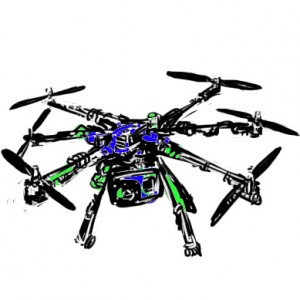 If you were one of the 219.4 million viewers of the recently-completed Sochi Winter Olympics, you probably saw your fair share of breathtaking moments captured on video, recall the heart-pounding rush of a skier or snowboarder rocketing down the mountains of the Aibiga Ridge, camera following close behind as they executed their final maneuvers.
If you were one of the 219.4 million viewers of the recently-completed Sochi Winter Olympics, you probably saw your fair share of breathtaking moments captured on video, recall the heart-pounding rush of a skier or snowboarder rocketing down the mountains of the Aibiga Ridge, camera following close behind as they executed their final maneuvers.
But the photographer behind those videos may not have been of the regular sort, mounted in a helicopter hovering above the slopes. Rather, it may have been a small, quiet, and nearly unnoticed observer, hovering like a spider from eight spindly rotors above the men and women of the Olympic Games.
Though this isn’t the first time that drones have been used to film sporting events, the games have most certainly been the greatest exposure for this emerging technology. Drones are preferable in many ways to the standard helicopter and camera crews used in events where high quality aerial video is preferred. Though drones like the HeliPOV used at the Sochi games aren’t cheap (most sporting drones run for around $40,000) they are considerably less expensive than running a full camera crew out of a chopper, which can run into the hundreds of thousands of dollars over the course of an event.
According to cameraman for alpine skiing commercials Remo Masina, drones are also useful for other reasons. “We can go really, really close. And we are really quiet, so nobody is distracted,” Masina said to an Associated Press reporter, noting that the hovering robots are especially useful. For athletes trying to focus on their event, the absence of a hovering chopper is calming, and the small visual silhouette of the drone is unobtrusive and easily ignored once the competition is in progress.
The use of drones at Sochi comes at a time when the technology is in hot dispute – military drones are still being debated in governments around the world, and recent unveilings such as the Amazon Air delivery drone and the United Arab Emirate’s state-run drone program have left some people feeling uneasy and uncertain.
But the filming of sporting events may be the one area where the use of drones seems entirely well-suited and unassuming. Where the idea of drones hovering over neighborhoods brings up uncomfortable questions on privacy and safety, drones at a ballgame seem like just another camera in a stadium where every guest fully expects (and even desires) to be filmed.
There’s some concern about crashes, but advocates are quick to point out that drones are no more likely to crash than a helicopter – and a helicopter is a whole lot heavier. In many cases, the draw of long, high quality, and uninterrupted aerial shots is just too good to pass up, especially for sports where such shots would be impractical or even impossible to do with a full crew.
So, whether or not you’re planning on getting your toothpaste delivered by drones by the year 2020, don’t be surprised if within the next couple years, you start seeing the Super Bowl halftime show filmed by one. Drones for sporting events are here to stay. “For sure,” Mesina said. They’re too perfect for the venue to be disregarded, and the ethical concerns raised against them in other settings simply don’t apply for sporting events.
If you see a HeliPOV or Heliguy hovering over the stadium, smile and wave! There’s no danger mounted on these propeller-mounted observers, only prime-time television.
Copeland is a member of the class of 2015.




